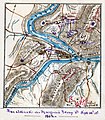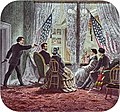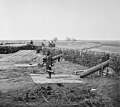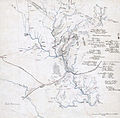american Civil War
The American Civil War (1861–1865) was a sectional rebellion against the United States of America by the Confederate States, formed of eleven southern states' governments which moved to secede from the Union after the 1860 election of Abraham Lincoln as President of the United States.
 |  |
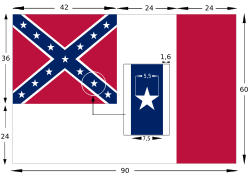
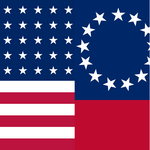
The Union's victory was eventually achieved by leveraging advantages in population, manufacturing and logistics and through a strategic naval blockade denying the Confederacy access to the world's markets.
In many ways, the conflict's central issues – the enslavement of African Americans, the role of constitutional federal government, and the rights of states – are still not completely resolved. Not surprisingly, the Confederate army's surrender at Appomattox on April 9,1865 did little to change many Americans' attitudes toward the potential powers of central government. The passage of the Thirteenth, Fourteenth and Fifteenth amendments to the Constitution in the years immediately following the war did not change the racial prejudice prevalent among Americans of the day; and the process of Reconstruction did not heal the deeply personal wounds inflicted by four brutal years of war and more than 970,000 casualties – 3 percent of the population, including approximately 560,000 deaths. As a result, controversies affected by the war's unresolved social, political, economic and racial tensions continue to shape contemporary American thought. The causes of the war, the reasons for the outcome, and even the name of the war itself are subjects of much discussion even today. (Full article)
The 68th New York Infantry Regiment served in the Union Army during the American Civil War. Also known as the Cameron Rifles or the Second German Rifle Regiment, the men were mostly German immigrants. Organized in July 1861, three months after the outbreak of war, the 68th saw service in the Eastern and Western theaters.
As a part of the Army of the Potomac, it was initially assigned to the defenses of Washington, D.C. Later, the 68th was transferred to the Shenandoah Valley and fought at the Battle of Cross Keys. The men of the 68th were then reassigned to central Virginia and found themselves in the thick of the fighting at Second Bull Run. After returning to the nation's capital, the regiment fought in Chancellorsville and was routed by Confederate forces. At Gettysburg, they saw battle on two of the three days and took heavy losses. (Full article...)

During the American Civil War, Arkansas was a Confederate state, though it had initially voted to remain in the Union. Following the capture of Fort Sumter in April 1861, Abraham Lincoln called for troops from every Union state to put down the rebellion, and Arkansas and several other states seceded. For the rest of the civil war, Arkansas played a major role in controlling the Mississippi River, a major waterway.
Arkansas raised 48 infantry regiments, 20 artillery batteries, and over 20 cavalry regiments for the Confederacy, mostly serving in the Western Theater, though the Third Arkansas served with distinction in the Army of Northern Virginia. Major-General Patrick Cleburne was the state's most notable military leader. The state also supplied four infantry regiments, four cavalry regiments and one artillery battery of white troops for the Union and six infantry regiments and one artillery battery of "U.S. Colored Troops." (Full article...)

Chester Alan Arthur (October 5, 1829 – November 18, 1886) was an American politician who served as the 21st president of the United States from 1881 to 1885. He was a Republican lawyer from New York who briefly served as the 20th vice president under President James A. Garfield. Arthur assumed the presidency after Garfield's death on September 19, 1881, and served the remainder of his term until March 4, 1885.
Arthur was born in Fairfield, Vermont, grew up in upstate New York and practiced law in New York City. He served as quartermaster general of the New York Militia during the American Civil War. Following the war, he devoted more time to New York Republican politics and quickly rose in Senator Roscoe Conkling's political organization. President Ulysses S. Grant appointed him as Collector of the Port of New York in 1871, and he was an important supporter of Conkling and the Stalwart faction of the Republican Party. In 1878, following bitter disputes between Conkling and President Rutherford B. Hayes over control of patronage in New York, Hayes fired Arthur as part of a plan to reform the federal patronage system. In June 1880, the extended contest between Grant, identified with the Stalwarts, and James G. Blaine, the candidate of the Half-Breed faction, led to the compromise selection of Ohio's Garfield for president. Republicans then nominated Arthur for vice president to balance the ticket geographically and to placate Stalwarts disappointed by Grant's defeat. Garfield and Arthur won the 1880 presidential election and took office in March 1881. Four months into his term, Garfield was shot by an assassin; he died 11 weeks later, and Arthur assumed the presidency. (Full article...)
- ... that Emma Dean Powell received a pass from General Ulysses S. Grant to accompany her husband to battlefield camps during the American Civil War after he lost his arm?
- ... that The Land We Love, a little magazine that merged into Southern Magazine, printed American Civil War recollections, poetry, agricultural material, and many works by female authors?
- ... that according to one historian, James S. Rains made a "significant contribution to the Confederate war effort" by getting drunk?
- ... that Carter Moore Braxton fought for the Confederacy throughout the American Civil War and, according to one report, had seven horses killed under him but avoided any wounds?
- ... that at the Battle of La Haye-du-Puits in July 1944, a Confederate flag dating to the American Civil War was raised over the town?
- ... that some Confederate bullets were sourced from a silver mine?
- Attention needed
- ...to referencing and citation • ...to coverage and accuracy • ...to structure • ...to grammar • ...to supporting materials
- Popular pages
- Full list
- Cleanup needed
- The West Tennessee Raids
- Requested articles
- James Ashby (soldier) • Bluffton expedition • Benjamin D. Fearing • Charles A. Hickman • Richard Henry Jackson • James B. Speers • Charles S. Steedman • Battle of Barton's Station • Lawrence P. Graham • Thomas John Lucas • Daniel Henry Rucker • James Hughes Stokes • Frederick S. Sturmbaugh • Davis Tillson • Action at Nineveh (currently a redirect) • International response to the American Civil War • Spain and the American Civil War • Savannah Campaign Confederate order of battle • Native Americans in the American Civil War (currently disambiguation after deletion) • 1st Battalion, Mississippi Mounted Rifles (Union) • Battle of Lafayette • Requested American Civil War Medal of Honor recipients
- Expansion needed
- Battle of Boonsborough • Battle of Guard Hill • Battle of Rice's Station • Battle of Simmon's Bluff • Battle of Summit Point • Charleston Arsenal • Edenton Bell Battery • First Battle of Dalton • Blackshear Prison • Edwin Forbes • Hiram B. Granbury • Henry Thomas Harrison • Louis Hébert (colonel) • Benjamin G. Humphreys • Maynard Carbine • Hezekiah G. Spruill • Smith carbine • Edward C. Walthall • Confederate States Secretary of the Navy • Confederate States Secretary of the Treasury • David Henry Williams • Battle of Rome Cross Roads • Delaware in the American Civil War • Ironclad Board • United States Military Railroad • Kansas in the American Civil War • Rufus Daggett • Ebenezer Magoffin • Confederate Quartermaster-General's Department • First Corps, Army of Northern Virginia • Francis Laurens Vinton • Henry Maury • Smith's Expedition to Tupelo • Other American Civil War battle stubs • Other American Civil War stubs
- Images needed
- Battle of Lone Jack • Preston Pond, Jr. • Melancthon Smith
- Merging needed
- 1st Regiment New York Mounted Rifles and 7th Regiment New York Volunteer Cavalry
- Citations needed
- 1st Alabama Cavalry Regiment (Union) • 4th Maine Battery • 33rd Ohio Infantry • 110th New York Volunteer Infantry • Battle of Hatcher's Run • Camp Dennison • Confederate colonies • CSS Resolute • Dakota War of 1862 • Florida in the American Civil War • Ethan A. Hitchcock (general) • Fort Harker (Alabama) • Gettysburg (1993 film) • Iowa in the American Civil War • Second Battle of Fort Sumter • Samuel Benton
- Translation needed
- Add an article here!
The following Wiki Foundation sister projects provide more on this subject:
- Shortcuts to this page: Portal ACW • P:ACW
This article uses material from the Wikipedia English article Portal:American Civil War, which is released under the Creative Commons Attribution-ShareAlike 3.0 license ("CC BY-SA 3.0"); additional terms may apply (view authors). Content is available under CC BY-SA 4.0 unless otherwise noted. Images, videos and audio are available under their respective licenses.
®Wikipedia is a registered trademark of the Wiki Foundation, Inc. Wiki English (DUHOCTRUNGQUOC.VN) is an independent company and has no affiliation with Wiki Foundation.













